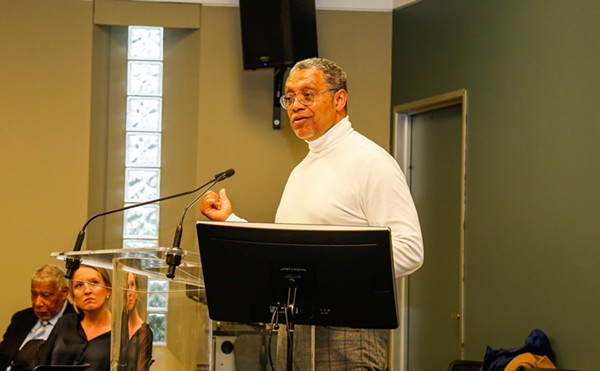Avery was stuck - and he would remain stuck for many years. But Al Cleveland's new path in life was just beginning.
As time went on, the two men's paths were emblazoned with the courts' actions. Where Avery's words were sucked into the canon of public record, others' were either pushed away or disregarded completely.
***
"He has completed his probation sentence and is free to go and to stay out of trouble," Al Cleveland's parole officer wrote, clearing him during an in-person meeting Aug. 7, 1991, in Queens, N.Y. Blakely's body would be discovered by Lorain police within the day, hundreds of miles away.
Ayasha Teague, a one-time neighbor of Cleveland in Bayside, Queens, testified in 1996 that there was no way Cleveland could have been in Lorain that night. She brought along a diary she had kept and showcased the entries spanning Aug. 5 - 11, 1991. Cleveland's name was referenced each day as Teague continually mentioned seeing him, except for Aug. 8. But when she mentioned the diary in court, Rosenbaum, the prosecutor, objected and had the book tossed out as evidence.
In fact, the prosecution never really denied that Cleveland was in New York City. They would go on to push all sorts of fanciful angles regarding flight times and high-speed drives across state lines. It's been noted time and time again, however, that not a single flight manifest in the country during that 24-hour period had Alfred Cleveland's name on it.
David Donaphin, a resident of Huntington, N.Y., grew up in the neighborhood with Cleveland. He explained that he was with Cleveland the night the murders happened. They were gathered around Cleveland's new BMW in their Queens neighborhood. More than a dozen other people were with them, all hanging out around 10 p.m. Aug. 7. According to Donaphin, he and Cleveland parted ways just before midnight that night. Epps and Blakely's bodies would be discovered by Lorain police in mere hours.
Donaphin was never subpoenaed.
***
A sordid upbringing. Pipe after pipe after pipe after.... An unending journey through witness protection. Torture of the mind and body would lead any man to the doorstep of faith and religion. Avery reached out to FBI agent William Beachum in Detroit in 2004. He was turning his life around by way of the Bible. He had found God. Knowing in his heart that he is and has always been the only person really capable of reversing Cleveland's fate, he admitted that he had lied about the course of events.
Within the year, private investigator Paul Ciolino - among the best in the world, many say - tracked Avery down and spoke with him. The young man, who had gone clean and ditched the crack, voluntarily recanted his past testimony. He was starting to talk to those people who would listen after all those years.
"William - he's really a hero in this case. When I found him and got him to give me a sworn statement, that was miracle stuff," Ciolino tells Scene. "Talk about a guy who was raised like a wolf in just a really terrible situation. He found religion and he wanted to come clean - it's as simple as that."
They spoke in early 2006, along with Cleveland's lawyer, Bruce Ellison. But there was nothing simple about arranging the meeting between the men. Cleveland's family had searched for Avery since as far back as 1998. They had hired a private investigator, who at one point nearly discovered Avery's whereabouts right before he fled. Around the same time, in the early 2000s, students from the Innocence Project at Northwestern University hired a private investigator who searched for Avery for two years with no success.
With Avery's statements and publicly sworn change of heart, Cleveland's lawyers sought a new trial by filing a petition of post-conviction relief in Lorain County Court of Common Pleas. The hearing came two years later in 2008. But prosecutorial interjections continued the trend of maintaining the conviction. Avery took the stand and found himself weighed down by the discouragement to recant from Judge Christopher Rothgery, Prosecutor Will Dennis and his own court-appointed local attorney. Avery was pushed to plead the Fifth and keep his mouth shut.
With 20 to 30 years in prison for perjury on the line should he admit the truth under oath - and nary a realistic chance at immunity - Avery's recantation in court has never been a given. He was stood down by Rothgery and Dennis years ago, and it's still unclear how things will play out if Cleveland's case for relief ever makes it back into a courtroom.
Moving from 2008 onward, Cleveland's legal action has been a cycle of appeals. Working outside of the narrowly specified timeframe, Cleveland's appeals have been dismissed by the Ohio Appeals Court and the Ohio Supreme Court. It took a federal panel of judges in 2012 to finally point out that very little in this case stands up to the law, save for the very clear fact that Alfred Cleveland couldn't have been in the right place and the right time to kill Marsha Blakely.
That ruling last fall was a jolting victory - one that always seemed just out of reach. But still, a new trial date has not yet been set.












